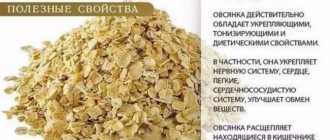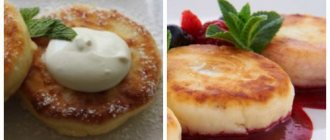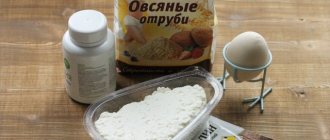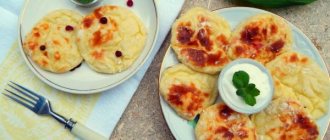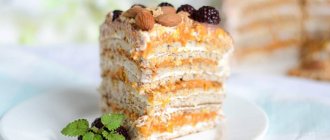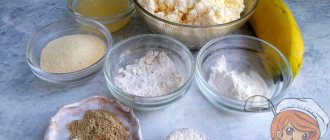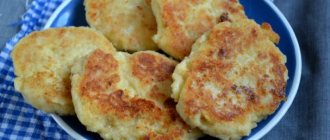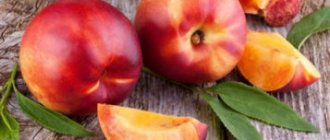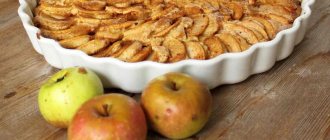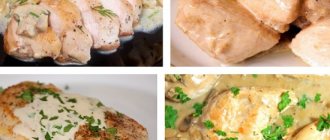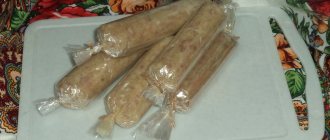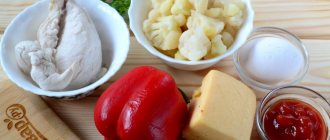Option 1: Classic recipe for cheesecakes with starch
There are situations when, for various reasons, flour cannot be used in the diet. What to do, especially when it comes to baking? We suggest replacing this ingredient with potato or corn starch. What will come of this? Let's make cheesecakes with starch together and answer this question right now.
Ingredients:
- 250 grams of cottage cheese;
- three spoons of sugar;
- large chicken egg;
- three tablespoons of starch;
- starch for deboning;
- salt for protein;
- refined oil in a frying pan.
Step-by-step recipe for cheesecakes with starch
Step 1:
Place the planned volume of cottage cheese in a bowl. Grind with a fork. Then add sugar inside, continuing mixing.
Step 2:
Separate the cool egg whites into a separate bowl. Throw the yolk into the cottage cheese. Stir it into the mixture.
Step 3:
Add a small pinch of salt to the whites. Beat a strong, tender mixture, which is immediately added to the sweet cottage cheese.
Step 4:
Knead a liquid heterogeneous mass into which add potato starch. Having received a sticky thick dough, cover the work surface with a portion of starch.
Step 5:
Roll out a “sausage” with wet, clean hands. Cut into pieces with a damp knife. Roll each additionally in starch, forming round pieces.
Step 6:
Now heat a little liquid oil on a hot, flat bottom of a frying pan. Place cheesecakes with starch one at a time.
Step 7:
Fry each side for a minute until crispy and delicious. Transfer to a plate and, after finishing the frying process, serve for breakfast with any drink (tea or milk).
You may need a little more starch. This depends on the quality and fat content of the cottage cheese, as well as the size of the egg. In any case, the dough should be viscous. After all, if you fill it with this ingredient, the cheesecakes will turn out rubbery. To make it easier to form the pieces, constantly wet your hands with water.
Dukan cheesecakes in a slow cooker
Dukan cheesecakes in a slow cooker will delight your soul and save time.
Ingredients
- Cottage cheese – 0.5 kg.
- Eggs – 3 pcs.
- Corn starch - 2 tbsp. l.
- Sweetener – 4-5 g.
- Baking powder – 1 tsp.
Preparation
- We connect all the components.
- Let's decide the most important question: do we want to tinker with portioned cheesecakes in order to prepare several small ones, or simplify the task and bake one large one, like a casserole. Depending on the decision, place the curd mass in the multicooker bowl accordingly.
- Set the multicooker to “baking” mode and cook the dessert for 40 minutes.
- We wait until the cheesecake has cooled and remove it from the bowl using a steaming basket.
That's all! As you can see, there are a lot of options for preparing awesome cheesecakes! All you have to do is try them out and find the one that suits you best.
Bon appetit!
Nutritional and energy value:
| Ready meals | |||
| kcal 1409.8 kcal | proteins 93.4 g | fat 15.5 g | carbohydrates 227.6 g |
| Portions | |||
| kcal 704.9 kcal | proteins 46.7 g | fat 7.8 g | carbohydrates 113.8 g |
| 100 g dish | |||
| kcal 195.8 kcal | proteins 13 g | fat 2.2 g | carbohydrates 31.6 g |
Recipe for cheesecakes with starch. Calorie, chemical composition and nutritional value.
Nutritional value and chemical composition of “Cheesecakes on starch”.
The table shows the nutritional content (calories, proteins, fats, carbohydrates, vitamins and minerals) per 100 grams of edible portion.
| Nutrient | Quantity | Norm** | % of the norm in 100 g | % of the norm in 100 kcal | 100% normal |
| Calorie content | 191.5 kcal | 1684 kcal | 11.4% | 6% | 879 g |
| Squirrels | 19.7 g | 76 g | 25.9% | 13.5% | 386 g |
| Fats | 5.7 g | 56 g | 10.2% | 5.3% | 982 g |
| Carbohydrates | 14.8 g | 219 g | 6.8% | 3.6% | 1480 g |
| Organic acids | 0.1 g | ~ | |||
| Alimentary fiber | 0.2 g | 20 g | 1% | 0.5% | 10000 g |
| Water | 57.4 g | 2273 g | 2.5% | 1.3% | 3960 g |
| Ash | 1.6834 g | ~ | |||
| Vitamins | |||||
| Vitamin A, RE | 25.3 mcg | 900 mcg | 2.8% | 1.5% | 3557 g |
| Retinol | 0.022 mg | ~ | |||
| beta carotene | 0.015 mg | 5 mg | 0.3% | 0.2% | 33333 g |
| Vitamin B1, thiamine | 0.057 mg | 1.5 mg | 3.8% | 2% | 2632 g |
| Vitamin B2, riboflavin | 0.394 mg | 1.8 mg | 21.9% | 11.4% | 457 g |
| Vitamin B4, choline | 12.45 mg | 500 mg | 2.5% | 1.3% | 4016 g |
| Vitamin B5, pantothenic | 0.32 mg | 5 mg | 6.4% | 3.3% | 1563 g |
| Vitamin B6, pyridoxine | 0.028 mg | 2 mg | 1.4% | 0.7% | 7143 g |
| Vitamin B9, folates | 2.463 mcg | 400 mcg | 0.6% | 0.3% | 16240 g |
| Vitamin B12, cobalamin | 0.42 mcg | 3 mcg | 14% | 7.3% | 714 g |
| Vitamin C, ascorbic acid | 0.74 mg | 90 mg | 0.8% | 0.4% | 12162 g |
| Vitamin D, calciferol | 0.003 µg | 10 mcg | 333333 g | ||
| Vitamin E, alpha tocopherol, TE | 0.886 mg | 15 mg | 5.9% | 3.1% | 1693 g |
| Vitamin H, biotin | 1.825 mcg | 50 mcg | 3.7% | 1.9% | 2740 g |
| Vitamin RR, NE | 3.7625 mg | 20 mg | 18.8% | 9.8% | 532 g |
| Niacin | 0.418 mg | ~ | |||
| Macronutrients | |||||
| Potassium, K | 205.93 mg | 2500 mg | 8.2% | 4.3% | 1214 g |
| Calcium, Ca | 229.74 mg | 1000 mg | 23% | 12% | 435 g |
| Magnesium, Mg | 32.36 mg | 400 mg | 8.1% | 4.2% | 1236 g |
| Sodium, Na | 84.96 mg | 1300 mg | 6.5% | 3.4% | 1530 g |
| Sera, S | 42.22 mg | 1000 mg | 4.2% | 2.2% | 2369 g |
| Phosphorus, P | 250.7 mg | 800 mg | 31.3% | 16.3% | 319 g |
| Chlorine, Cl | 95.03 mg | 2300 mg | 4.1% | 2.1% | 2420 g |
| Microelements | |||||
| Aluminium, Al | 4.6 mcg | ~ | |||
| Iron, Fe | 0.396 mg | 18 mg | 2.2% | 1.1% | 4545 g |
| Yod, I | 5.49 mcg | 150 mcg | 3.7% | 1.9% | 2732 g |
| Cobalt, Co | 0.336 mcg | 10 mcg | 3.4% | 1.8% | 2976 g |
| Manganese, Mn | 0.0055 mg | 2 mg | 0.3% | 0.2% | 36364 g |
| Copper, Cu | 14.32 mcg | 1000 mcg | 1.4% | 0.7% | 6983 g |
| Molybdenum, Mo | 3.557 mcg | 70 mcg | 5.1% | 2.7% | 1968 |
| Tin, Sn | 1.2 mcg | ~ | |||
| Selenium, Se | 0.923 mcg | 55 mcg | 1.7% | 0.9% | 5959 g |
| Strontium, Sr | 1.57 mcg | ~ | |||
| Fluorine, F | 13.84 mcg | 4000 mcg | 0.3% | 0.2% | 28902 g |
| Chromium, Cr | 1.75 mcg | 50 mcg | 3.5% | 1.8% | 2857 g |
| Zinc, Zn | 0.3273 mg | 12 mg | 2.7% | 1.4% | 3666 g |
| Digestible carbohydrates | |||||
| Starch and dextrins | 7.703 g | ~ | |||
| Mono- and disaccharides (sugars) | 7.1 g | max 100 g | |||
| Lactose | 4.548 g | ~ | |||
| Essential amino acids | 1.3134 g | ~ | |||
| Arginine* | 0.1262 g | ~ | |||
| Valin | 0.206 g | ~ | |||
| Histidine* | 0.0847 g | ~ | |||
| Isoleucine | 0.2156 g | ~ | |||
| Leucine | 0.3831 g | ~ | |||
| Lysine | 0.2393 g | ~ | |||
| Methionine | 0.108 g | ~ | |||
| Methionine + Cysteine | 0.1533 g | ~ | |||
| Threonine | 0.1842 g | ~ | |||
| Tryptophan | 0.0502 g | ~ | |||
| Phenylalanine | 0.2046 g | ~ | |||
| Phenylalanine+Tyrosine | 0.4202 g | ~ | |||
| Nonessential amino acids | 2.1989 | ~ | |||
| Alanin | 0.1522 g | ~ | |||
| Aspartic acid | 0.3471 g | ~ | |||
| Glycine | 0.0941 g | ~ | |||
| Glutamic acid | 0.8239 g | ~ | |||
| Proline | 0.4238 g | ~ | |||
| Serin | 0.2588 g | ~ | |||
| Tyrosine | 0.2152 g | ~ | |||
| Cysteine | 0.0455 g | ~ | |||
| Sterols (sterols) | |||||
| Cholesterol | 11.35 mg | max 300 mg | |||
| beta sitosterol | 3.69 mg | ~ | |||
| Saturated fatty acids | |||||
| Saturated fatty acids | 2.4 g | max 18.7 g | |||
| 4:0 Oil | 0.0028 g | ~ | |||
| 6:0 Kapronovaya | 0.0009 g | ~ | |||
| 8:0 Caprylic | 0.0009 g | ~ | |||
| 10:0 Kaprinovaya | 0.0018 g | ~ | |||
| 12:0 Lauric | 0.0009 g | ~ | |||
| 14:0 Miristinovaya | 0.0101 g | ~ | |||
| 16:0 Palmitinaya | 0.1448 g | ~ | |||
| 18:0 Stearic | 0.0858 g | ~ | |||
| 20:0 Arakhinovaya | 0.0055 g | ~ | |||
| 22:0 Begenovaya | 0.0129 g | ~ | |||
| Monounsaturated fatty acids | 0.4649 g | min 16.8 g | 2.8% | 1.5% | |
| 14:1 Myristoleic | 0.0009 g | ~ | |||
| 16:1 Palmitoleic | 0.0018 g | ~ | |||
| 18:1 Oleic (omega-9) | 0.4557 g | ~ | |||
| Polyunsaturated fatty acids | 1.107 g | from 11.2 to 20.6 g | 9.9% | 5.2% | |
| 18:2 Linolevaya | 1.1052 g | ~ | |||
| 18:3 Linolenic | 0.0018 g | ~ | |||
| 20:4 Arachidonic | 0.0009 g | ~ |
The energy value of cheesecakes made with starch is 191.5 kcal.
Primary Source: Created in the application by the user. Read more.
** This table shows the average levels of vitamins and minerals for an adult. If you want to know the norms taking into account your gender, age and other factors, then use the “My Healthy Diet” application.
Similar Recipes
How to prevent the dough from burning? To prevent the dough from burning, you need to put a bowl of water in the oven. It does not matter what test we are talking about. It can be any dough: unleavened, yeast, biscuit, shortbread, choux,…
- Read completely
How to make perfect pancakes Pancake dough can be completely different in composition and taste. * The main rule is the freshness of all ingredients and the appropriate temperature. – Do not cook with cold milk or water, eggs should...
- Read completely
Golden color of pancakes If you add not vegetable oil to the pancake dough, but a few tablespoons. melted butter, the pancakes will have more holes and a nice golden color.
- Read completely
How to get baked goods out of a one-piece mold To avoid problems with getting the finished baked goods out of a one-piece mold, first cut out a circle from cardboard with a diameter equal to the mold and wrap it in foil. Place two crosses on the bottom of the mold...
- Read completely
How to replace eggs in sweet baked goods In sweet baked goods, you can use one of these methods instead of eggs: • 1 egg = 1 tbsp cornstarch + 2 tbsp water; • 1 egg = 1 banana, pureed in a blender; • 1 I...
- Read completely
Pancakes will be easier to fry... You can add 100 or 150 ml of vegetable oil to the pancake dough. In this case, the pancakes will fry better and be easier to remove from the pan.
- Read completely
How to form perfectly round cheesecakes To form perfectly smooth and even cheesecakes, you need to do the following - take our cheesecake blanks, bread them in flour, cover with a glass or mug of larger diameter. We rotate without any special...
- Read completely
Dukan cheesecakes with herbs
Dukan cheesecakes with herbs will diversify your usual menu.
Ingredients
- Cottage cheese – 200 g.
- Oat bran – 2 tbsp. l.
- Eggs – 1 pc.
- Low-fat yogurt or kefir - about 2 tbsp. l.
- Dill - to taste
- Seasonings – salt.
Preparation
- Mix cottage cheese, eggs and bran together. You can use a blender for kneading.
- We add a little plasticity to the mass by adding yogurt or kefir, but do not overdo it, since the cheese mass should hold its shape well and not spread.
- Add chopped dill and salt. Mix well.
- Place the cheese balls in a heat-resistant glass dish and bake in the oven for about half an hour, or fry in a frying pan.
Point No. 1: choosing cottage cheese
Like any food, cheesecakes start with purchasing groceries. Those three or four ingredients can vary very significantly, but one remains unchanged: cottage cheese (although it can be replaced, but more on that later). In principle, there is no cottage cheese from which it would be impossible to make cheesecakes at all, but there are ideal options, there are average ones, and there are bad ones. Among the latter, I would include, first of all, low-fat and soft cottage cheese in tubes. It is great for creams and mousses due to its delicate consistency and the large amount of liquid it contains. But the liquid in cottage cheese is the main enemy of cheesecakes, and a low percentage of fat is also not a friend. Curd grain in cream is also not suitable for us - it contains not only liquid, but also pieces, they are of no use to us either. The middle option is cottage cheese in rectangular packs. It looks dense, but there is still more liquid in it than necessary. Oddly enough, I would also classify the delicious, but expensive layered homemade (farm) cottage cheese sold in the markets as a middle option - and again because of the liquid. It is easy to squeeze out, but as a result the price of your cheesecakes will be unreasonably high. There are people who like to make cheesecakes from curd mass - but they are too sweet and fatty. So the ideal cottage cheese for cheesecakes is this: as dry as possible, slightly crumbly, with a fat content of at least 5%. I like farmer's by weight the most.
The ideal cottage cheese for cheesecakes is as dry as possible, slightly crumbly, with a fat content of at least 5%
Option 2: Quick recipe for cheesecakes with starch in the oven
Quick cheesecakes can be made by using a food processor to mix the ingredients and transferring the cooking process to the oven, where we bake all the ingredients in one go.
Ingredients :
- a pack of fatty cottage cheese;
- cool large egg;
- about three tablespoons of sugar;
- three full tablespoons of starch;
- oil for greasing the baking sheet;
- vanilla to taste.
How to quickly prepare cheesecakes with starch
Step 1:
Place the cottage cheese into the container of the food processor. Start the slow mixing process. After a few seconds, beat in the cold egg.
Step 2:
Next add sugar, vanilla and starch. Bring the mass in the container to a viscous structure.
Step 3:
Now turn the oven to 180 degrees. Line a baking sheet with thin parchment. Grease with a layer of refined oil.
Step 4:
Scoop up the thick curd dough with a spoon and place it on the surface of the paper. Press down lightly to form a flat round piece.
Step 5:
Place cheesecakes with starch in the oven. Bake for ten minutes. Switch the cabinet to high heat. Cook for another six to seven minutes. Cool (slightly) and serve.
Since we bake the curd dessert in the oven, there is no need to increase the amount of starch, even if the dough is not strong. Thanks to the uniform distribution of high temperature, the workpieces will quickly “set”.
Dukan cheesecakes with corn starch
Dukan cheesecakes with cornstarch are very similar to regular ones.
Ingredients
- Cottage cheese – 200 g.
- Eggs – 1 pc.
- Skimmed milk powder – 1 tbsp. l.
- Corn starch - 1 tbsp. l.
- Low fat cocoa (optional) – 1 tbsp. l.
- Baking powder – 0.5 tsp.
- Sweetener – 1 g.
Preparation
- Grind cottage cheese with egg and sugar substitute.
- Add dry ingredients and mix well.
- We fry dietary cheesecakes in a frying pan or bake them in the oven using one of the methods described above.
How to cook “Cheesecakes with starch”
Let's prepare the ingredients.
Pour sugar, salt into a bowl and add an egg. Whisk everything together.
Add cottage cheese and vanilla essence and mix.
Add a spoonful of starch and mix everything again.
Pour starch onto a flat plate. We make cheesecakes and roll them in starch.
Place the cheesecakes in a frying pan with heated sunflower milk and fry on both sides until light golden brown.
Cheesecakes with starch are ready. Help yourself.
Cheesecakes according to Dukan for Attack
Dukanhub Every housewife most carefully selects a recipe for delicious cheesecakes to add to her culinary treasure chest.
However, what to do if at the moment the most important task for you is losing weight according to Dukan,... Recipes according to Dukan, Dukan casserole, cottage cheese casserole, European, Dietary, Dukan diet Print Servings: 3 Preparation time: 10 Min Cooking time: 10 Min10 Min Energy value 170 Kcal 12 Fat
How delicious it is 5.0/5
(2 votes)
Ingredients
- Low-fat granular cottage cheese – 200 g.
- Oat bran – 4 tbsp. l.
- Eggs – 2 pcs.
- Baking powder – 1 tsp.
- Seasonings – salt, sugar substitute and vanilla.
- Low-fat yoghurt for serving – 100 ml.
Preparation
- Beat the eggs into a thick foam. A little secret: you will never be able to beat eggs into a thick foam in a wet bowl, even if even a drop of water gets in there. Even the eggs themselves should be wiped dry with a napkin after washing.
- Carefully add cottage cheese, bran, salt, sugar substitute and vanilla to the egg foam, carefully mixing the ingredients with a spatula.
- Grease a frying pan with a flat frying surface with a thin layer of vegetable oil and heat it well. It is better to take a frying pan with a thick bottom or non-stick coating. This will allow you to fry the cheesecakes with a minimum amount of oil.
- Roll the cheese mass into even balls and flatten it a little, put it in a frying pan and fry on both sides until golden brown.
- Place on a plate and serve topped with low-fat yoghurt.
Point No. 3: eggs
This point is completely determined by the previous two. If you have the right cottage cheese, it requires very few eggs. Remember that in an egg, the yolk acts as fat and the white acts as water. One egg is enough for 500 g of cottage cheese! You can add an extra yolk to low-fat cottage cheese, but avoid excess white.
One egg is enough for 500 g of cottage cheese. Remember that in an egg, the yolk acts as fat and the white acts as water.
Calorie content of foods possible in the dish
- Egg white – 45 kcal/100g
- Egg yolk – 352 kcal/100g
- Egg powder – 542 kcal/100g
- Chicken egg – 157 kcal/100g
- Ostrich egg – 118 kcal/100g
- Cottage cheese – 156 kcal/100g
- Cottage cheese 10% fat – 156 kcal/100g
- Cottage cheese 18% fat – 226 kcal/100g
- Cottage cheese 20% fat – 233 kcal/100g
- Cottage cheese 40% fat – 466 kcal/100g
- Cottage cheese “Vitalinia” – 64 kcal/100g
- Cottage cheese “morning” (“danone”) without sugar – 91 kcal/100g
- Soft dietary cottage cheese – 170 kcal/100g
- Low-fat cottage cheese – 75 kcal/100g
- Cottage cheese with sour cream – 260 kcal/100g
- Fruit cottage cheese – 147 kcal/100g
- Sugar – 398 kcal/100g
- Granulated sugar – 398 kcal/100g
- Starch – 320 kcal/100g
- Vegetable oil – 873 kcal/100g
- Vanillin – 288 kcal/100g
- Baking soda – 0 kcal/100g
Calorie content of foods: Cottage cheese, Eggs, Sugar, Starch, Vanillin, Baking soda, Vegetable oil
Cheesecakes without flour with semolina
- Time: 40 minutes.
- Number of servings: 6 persons.
- Calorie content of the dish: 273 kcal/100 g.
- Purpose: breakfast, dessert.
- Cuisine: Russian.
- Difficulty: easy.
It’s possible to make cheesecakes without adding flour; you need to use semolina. The result is a delicate delicacy with a crispy crust (pictured). You can diversify the taste of the dish with the help of raisins, dried apricots, prunes or candied fruits added to the curd dough . Serving cheesecakes is delicious with apple, sour cream, jam or jam, yogurt, condensed milk, and cinnamon.
Ingredients:
- cottage cheese (9% fat) – 200 g;
- chicken egg – 5 pcs.;
- semolina – 270 g;
- granulated sugar – 75 g;
- salt – 0.5 teaspoon;
- vegetable oil – 150 ml.
Cooking method:
- Place the cottage cheese in a bowl and break the eggs there.
- Add sugar, salt and most of the semolina to the mixture (leave some for breading), mix well.
- Leave the contents of the bowl for half an hour for the semolina to swell.
- Heat oil in the bottom of a frying pan.
- With wet hands, form cheesecakes and roll them in cereal.
- Fry cheesecakes with semolina without flour for 3-5 minutes on each side.
Point No. 4: flour
Same story. If there is no water in the cottage cheese, it is dense and viscous - very little flour is needed. For 500 g, three, well, four tablespoons are enough. You can replace some or all of the flour with another type of flour: oatmeal, rice, buckwheat, etc. But you need to remember that there is no gluten in it, and to prevent the cheesecakes from falling apart, it makes sense to add a spoonful of starch - corn or potato. I usually put semolina instead of flour - it makes the cheesecakes fluffy without any baking powder.
For 500 g, 3-4 tbsp is enough. l. flour. Flour can be replaced with semolina - it makes cheesecakes fluffy without any baking powder
Cheesecakes in the oven without flour
- Time: 40 minutes.
- Number of servings: 4 persons.
- Calorie content of the dish: 121 kcal/100 g.
- Purpose: breakfast, snack.
- Cuisine: Russian.
- Difficulty: easy.
Cottage cheese without flour is an ideal breakfast for those losing weight. They contain a minimum of calories, but are very nutritious, have a delicate taste and pleasant texture. These cheesecakes can be served either warm – delicious with sour cream (as in the photo), grated berries or yogurt, or cold – with tea, coffee or fruit juice. Before cooking them (it is better to use homemade cottage cheese), you can add frozen berries or raisins to the dough, it turns out delicious.
Ingredients:
- cottage cheese (5%) – 500 g;
- milk – 100 ml;
- chicken egg – 2 pcs.;
- oatmeal (ground) - 2 tablespoons;
- vanilla sugar – 2 teaspoons.
Cooking method:
- Beat cottage cheese with milk and egg in a blender or mix thoroughly by hand.
- Add oatmeal and sugar, knead the dough.
- Preheat the oven to 180 degrees.
- Place the dough in the form of balls on a silicone baking mat (you can use muffin tins).
- Bake for 15 minutes, then reduce the temperature to 150 degrees and keep the cheesecakes in the oven for the same amount of time.
Item No. 6: baking powder
In fact, cheesecakes don’t need baking powder - once they rise in the pan, they will still fall off, and this is always very disappointing. But any dough with the addition of baking powder as a result is less dense and softer than without it. So this ingredient is your choice. By the way, the correctly selected ratio of cottage cheese and starch, as well as the temperature regime in the frying pan, helps cheesecakes and casseroles not to fall. Unfortunately, you need more starch. And the fire should be low so that the cheesecakes bake gradually.
Point No. 7: standing
Now this is very important. Even if you did everything correctly in the previous 6 points, kneaded the curd dough, made cheesecakes - and immediately rushed to fry them, there is a high probability that they will fall apart. Flour/semolina and eggs with cottage cheese in the dough need to be properly married. Liquids (there are still some) need to be absorbed, gluten, if any, needs to develop, any flour or cereal needs to swell. This requires at least half an hour in the refrigerator. But the best cheesecakes are “tomorrow’s”, from dough made the night before.
The best cheesecakes are “tomorrow’s”, from dough made the night before
